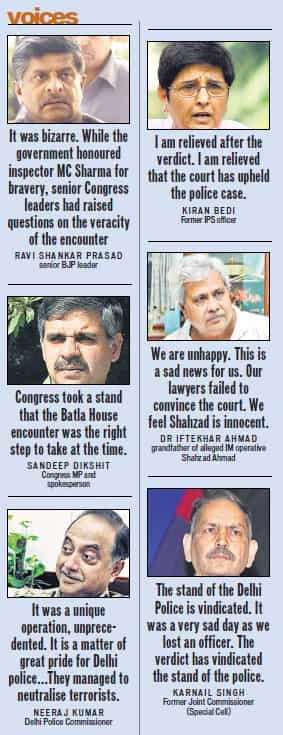Evidence from spot proved crucial
Convicting alleged Indian Mujahideen operative Shahzad Ahmed of murdering Delhi Police inspector MC Sharma, the trial court said circumstantial evidence and call records were sufficient to establish his presence at L-18, Batla House, when the encounter took place. Harish V Nair reports.
Convicting alleged Indian Mujahideen (IM) operative Shahzad Ahmed of murdering Delhi Police inspector MC Sharma, the trial court said circumstantial evidence and call records were sufficient to establish his presence at L-18, Batla House, when the encounter took place.

Additional Sessions Judge RK Shastri rejected Shahzad’s lawyer’s argument that there was no proof that he was present at the scene of the encounter.
The lawyer had also argued that the absence of a single independent or public witness indicated the police “framed” the accused.

All seven eyewitnesses in the case were policemen who had accompanied Sharma.
“Public apathy in joining investigation in heinous offences is well known so if the police could not join any public person, the same is not fatal to the case of the prosecution,” the judge said.
Apart from the depositions of the witnesses, there were other circumstances that favoured the prosecution, the judge said. These included the recovery of Shahzad’s passport from the same flat.
Then, there was a conversation from a phone registered in the name of co-occupant Atif Ameen from the flat with the father of Shahzad at the latter’s phone.The reservation of a railway ticket in Shahzad’s name, showing him leaving Delhi six days after the incident from New Delhi Railway Station in a train, was another piece of circumstantial evidence, the judge said.
When the defence pointed out the delay in lodging of an FIR by more than five hours, the court said: “In my opinion, it was not unreasonable if the investigating officer opted to visit the injured in the hospital before registration of an FIR, particularly when the injured is none but one of his colleagues.”
Focus on “religion of witnesses”
When asked about the lack of independent witnesses, the police had told the court that “majority of the residents of that area were followers of the same religion as the suspects and if police officers tried to involve any such local resident, it would have caused social unrest in the area”.
The court retorted: “No religion professes crime as its tradition...why did the police foster a belief that it will stir communal violence if they invited local residents to join a raid, to arrest an offender, who belonged to their religion?”.
Arguing that the police had failed to present any public witnesses to back its version, Shahzad’s lawyer had said: “The police did not take along any independent witness despite the fact that there were people near commercial shops near Abbasi Chowk and the Khalilullah mosque.”



